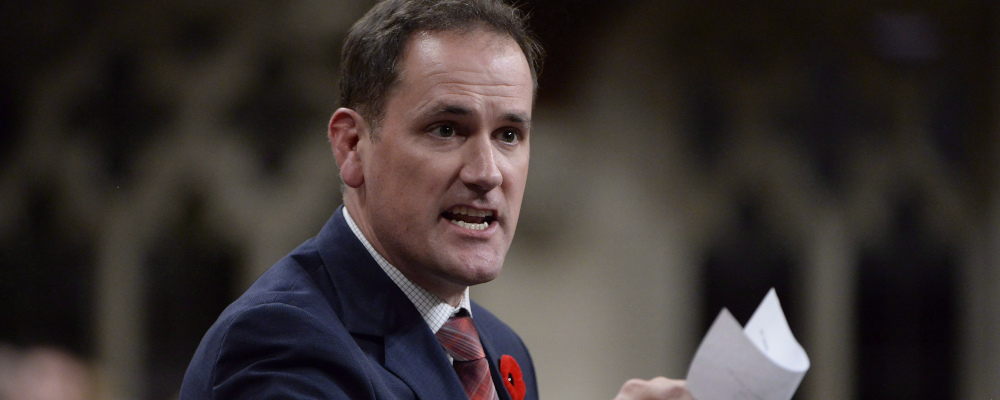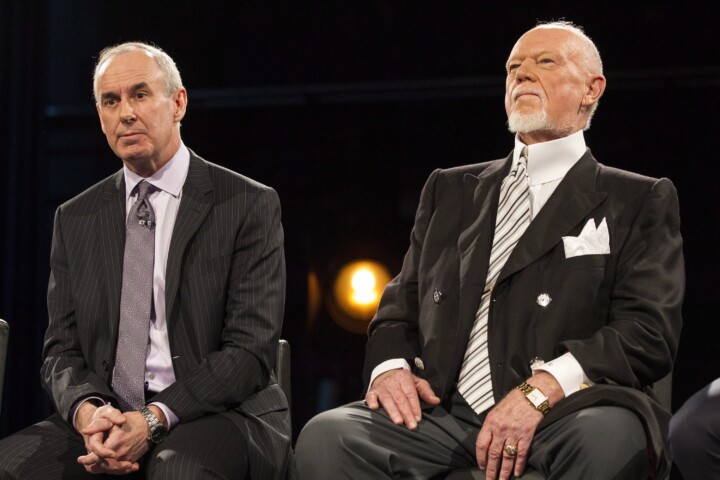In this Hub Dialogue, part of our new policy in action series, The Hub’s editor-at-large Sean Speer speaks to Dan Albas, the member of parliament for Central Okanagan—Similkameen—Nicola and Conservative shadow minister of environment and climate change.
This new series of dialogues will be removed from day-to-day partisanship or the “who’s up and who’s down” focus of the mainstream media, instead focusing on candid conversations with parliamentarians who are leading different issues that are important to Canada’s future.
This conversation has been revised and edited for length and clarity.
Sean Speer
MP Albas, since you were first elected in 2011, you’ve distinguished yourself in Parliament as someone who’s genuinely focused on public policy and governance issues. In the world of hyper-partisanship, that must be challenging at times — especially since you wear many hats including member of a caucus, member of the shadow cabinet, and a local representative. Can you start by reflecting on how you’ve navigated the world of politics over the past 10 years, and about your role as a member of Parliament?
MP Dan Albas
That’s a great question. My first priority coming to Ottawa was just getting a sense of the people and the processes. Parliament is a great institution, and I remember walking down the halls and feeling very humbled. There was so much going on, including press conferences, parliamentary debates, and committee reviews. It’s an amazing place.
But the key is to remember that, at the end of the day, your electorate nominates you as their representative, and you have to find a way to make it work. I like to say it’s like a Rubik’s Cube, that every day something comes up. And even though yesterday, you got the Rubik’s Cube where all the colors match up, the next day, it’s reset, and you have to figure out how you’re going to do that again.
The biggest thing I’ve noticed is that one of the issues we have in Canadian politics is it doesn’t always matter about the merit of the individual idea or proposal. It’s often either embraced or dismissed based on the political party that a member belongs to. And I think that that needs to change.
One of the greatest things about this country is, thinking back to following the 2015 election, was seeing Mr. (Stephen) Harper and Prime Minister (Justin) Trudeau both laying a wreath on Remembrance Day at the War Memorial in Ottawa. That smooth transition to power is incredibly symbolic of “peace, order and good government.”
That’s exactly what the framers of our constitution wanted to see. Mr. (Brian) Mulroney as prime minister brought in the GST. Mr. (Jean) Chrétien ran against it, but then kept the policy. You saw Mr. Chrétien started to do more free trade [after opposing the North American Free Trade Agreement], and when Mr. Harper came in, he expanded the free trade agenda even further. So, I do think that there’s some very big policy points in our history that we can look to, where it’s about embracing an idea because of what it serves as opposed to who put it forward.
And that’s one question that I always ask myself: is the status quo serving us? Is our current framework built on old ideas? Are they still serving us? And if not, then how do we propose next ones? And I think the way we do that is by moving past the simple judgment about who’s the messenger and instead focusing on what the message is.
Sean Speer
You have exhibited this principle in your time in Parliament. We will talk in a minute about a new private member’s bill that you’ve just tabled in Parliament. But let’s first speak about the private member’s bill that you successfully passed in 2012 with unanimous support. Can you tell readers about Bill C-311, what it was trying to accomplish, and how you managed to get such broad-based support?
MP Dan Albas
Bill C-311 was the “Free My Grapes” bill. Being from Okanagan, I represent two wine regions: the Okanagan Valley and the Similkameen Valley. When I first did my listening tour after being elected, I heard from chambers of commerce, councillors, mayors, and wineries that small family wineries had the most to gain by opening up the interprovincial trade of Canadian wine.
At the time, there was an old act called the Importation of Intoxicating Liquors Act that was administered by the CRA. It was a prohibition-era piece of legislation that effectively said that you could face a $200 fine for importing wine across interprovincial borders outside of provincial wholesale monopolies. Back in 1928, when it was first amended, that was a lot of money. It also had the potential for jail time.
The problem was that small family wineries often don’t have enough supply or production to sell to a major liquor monopoly like the LCBO in Ontario or the SAQ in Quebec. So they were effectively stuck serving small regional and local markets.
But if we could amend the law to open up to the whole country, that’s a big opportunity, and people would invest. I remember speaking to John Skinner of Painted Rock, just outside of Penticton, B.C. And I asked him, “If you had a bigger market, what’s the first thing you would do?” He said, “Dan, if this country believes in me and your Bill C-311 passes, I will put in a Tasting Centre [at the winery].” That was probably a million bucks right there. Well, guess what? After it passed in 2012, he did follow up with it. And it’s a beautiful centre that people can go to — people get married there all the time. So, there’s a lot of economic activity that’s happening from that.
We always need to ask ourselves, what are the things we want to maintain? What are the things we may have to let go? What are the things that we want to keep that we are losing? And how do we strengthen those institutions and strengthen those things so we can pass on a Canada that’s even better for the next generation?
In this case, those particular laws didn’t serve us. It was great to see that Parliament got behind it. There was a little bit of back and forth between the opposition and myself, but it flew through the Senate, and that was a good thing. It was great to see that Jim Flaherty’s 2014 budget extended the same treatment to beer and spirits.
You start with asking if something is of service, and then presenting a better, more viable option, and getting people to say, “yes.”
Sean Speer
That’s a good segue to what we want to talk to you about today – the new private member’s bill that you’ve just tabled in Parliament. MP Albas, why don’t you set the stage for readers: what does the bill aim to accomplish? And why are you moving forward now?
MP Dan Albas
I’ve spoken to a number of younger people that are in university or learning to trade in my riding and elsewhere in the country. They’re facing various strains. Obviously, house prices have accelerated. We know that student debt is a huge area of economic anxiety for many of these young persons. And when I speak to their parents or their grandparents, they’re concerned that they’re not going to inherit the same kind of opportunities that was there for them.
And so again, we have to ask: is the status quo serving us? If someone, for example, is learning a skilled trade, they can take an apprenticeship training, and they can use Canada Student Loans to help pay for that. But when they do their apprenticeship, if the company that they work for was to say, “Look, I’ll help you pay down your apprenticeship loans,” right now it would count as income under the Income Tax Act, and they would be taxed for it.
What my bill proposes is that whether it’s for an apprenticeship loan, if it’s a student loan for post-secondary education, or even a provincially-administrated program, if an employer and employee comes to an agreement that part of their renumeration is going be directly paid to reduce the employee’s student debt, that would not count as income for the purposes of the Income Tax Act.
So, it’s a provision under Section Six, subsection 1(a), and it doesn’t involve any paperwork. The employer-directed payment to an employee’s student debt load just wouldn’t count as income for the purposes of CRA when you fill out your income tax. This is a small, but important step to help support young people, or for students so that they can quickly pay off their student debt, and start saving for the future. It’s also a great way to incentivize them to work and to build good financial management skills.
Sean Speer
It’s a really innovative proposal. It’s become increasingly clear that high student debt is one of a handful of factors which is contributing to delayed family formation. People are getting married, buying homes, and starting families later than they have historically, due in part to financial challenges like high student debt loads. So, while on one hand, this is an economic policy, it could, on the other hand, also have important social policy effects.
When I read about the bill, it reminded me of the current tax treatment of employer-provided health and dental benefits, which, as many readers know, are presently provided by employers on a tax-free basis. That tax treatment has created the conditions by which the majority of Canadians have some form of employer-provided health and dental benefits. So, in that sense, there’s evidence that changing the tax treatment of different forms of employer compensation can actually spur new and different employee-employer arrangements.
You want to maybe just elaborate on whether you are familiar with any other jurisdictions that have experimented with something like this, or your sense of how employees and employers might take advantage of this change in tax treatment?
MP Dan Albas
For employers, this is an opportunity if it’s a recruitment bonus, a bonus for commissions, or for a job well done. The government also gets the benefit of receiving payment on the student loans faster. And everyone’s happy, because it’s not costing the employer a dollar. But, the take-home income of that student is certainly higher.
That’s really what we want to do. We want to incentivize people to work, and we want them to pay those loans down.
In my own family, I remember my mother telling me about how she worked to help get my father through the last semester of law school so he could qualify for his bar exam. Families understand that bills need to be paid. And as you said about having a family, that’s something I hear all the time from people, that they’re putting off their dreams of owning a home, or having a family, because of this debt is staring them in the face.
As for other jurisdictions, we can just look to the south of the border. Last year the CARES Act was adopted in Congress, with bipartisan support. Now, the United States has a much different system for student loans: the tax relief on employer payments to student loans therefore applies to both public loans as well as private loans. My private member’s bill only relates to government loans because that’s such a major part of the system we use here.
At the level of first principles, philosopher Karl Popper had this idea about reverse utilitarianism. What that means in a nutshell is that, instead of trying to make everyone happy, what you try to do is you focus your resources on those that are in the most need. Because often times, there’s not enough resources to maximize everything.
I think Popper’s concept applies here, because if you receive a government student loan, here in Canada, it’s means-tested and capped. So essentially, those that would receive the most help and support usually are those in lower quintiles. By enabling employers to help pay down these student loans, it’s an important step for making sure we have equal opportunity: to help those that want to have a better tomorrow, who want to get educated, learn a trade so they can move into meaningful work.
Sean Speer
Maybe we can end where we started, which is about balancing sound, evidence-based public policy, with a process that is inherently political, particularly in the context of a minority parliament. Do you have a sense of whether this idea can find support in Parliament?
MP Dan Albas
I believe that when you say to someone that the challenge that young people face is materially different than previous generations, I think all political parties would agree with that. The question is now how? By encouraging people to get to work, and to set aside some of their income, so that they can pay down those debts, I think it is a good thing.
I would hope it would not be controversial. Again, this is where I would go back to the premise: I really hope that the idea is judged on its merit, rather than its messenger.
Sean Speer
Well, congratulations on developing the proposal and getting it before Parliament. We will be following it closely. Good luck.
MP Dan Albas
Thanks so much, Sean.
Recommended for You

Sean Speer: Maybe Ron MacLean is the one who needs to go

Falice Chin: A tale of two (Poilievre) ridings

Evan Menzies: Calgary at 150: Why is it so hard to celebrate our history?

Howard Anglin: Canada is badly failing the ‘Tebbit Test’



